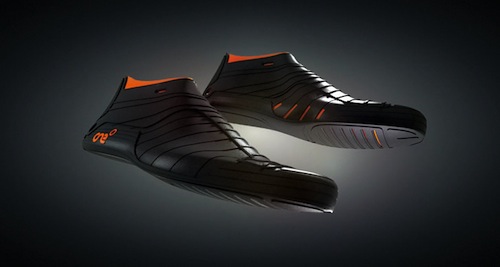
IDEA gold medalist Nina Viggi’s One Degree High Performance Dinghy Shoe.
Since its inception in 1965, the Industrial Designers Society of America (IDSA) has recognized “positive impact” in design. In 22 years of competition, Art Center students have taken 70 medals in IDSA’s highly competitive International Design Excellence Awards (IDEA).
When IDSA announced the most recent IDEA winners, they included—among Art Center’s eight finalists in the 2013 competition—three medal winners. Graduate Industrial Design student Nina Viggi took home a gold medal for her One Degree High Performance Dinghy Shoe, designed for competitive sailing.
Product Design students also earned medals: Marc Dubui the silver for a hard-hat suspension system he calls Oblikk, which protects the wearer from lateral and rotational impact; and Shingo Mamiya the bronze for A Better Working Environment for Certified Nursing Assistants, a chair equipped with a built-in system that provides a safer, more efficient way to bathe elderly or infirm clients, as well as dispose of their waste.
Viggi, who has 10 years under her belt competing in high-performance fleets around the world, is intimately familiar with the sport. She recognized that the more traditional products created for the elite sailing market had not kept up with the sport’s evolution and growing popularity, as events like the America’s Cup generate “aspirational associations” in mainstream markets. As the sport transitions from a lifestyle brand to an outdoors brand, Viggi says, the industry remains behind the curve when it comes to thinking about equipment and performance. “More aerodynamic apparel could only be found in more accessible sports like surfing and windsurfing. Brands have been trying to chase sailors’ expectations but always fall short.”
Art Center’s rigorous, transdisciplinary Grad ID degree program required that Viggi prove her ability to forecast a product’s growth opportunities over the next five to 10 years. “Never once,” she remembers, “was I juggling just product design without being reminded of manufacturing constraints, sourcing materials and developing a brand strategy.”
The sleek One Degree shoe is light, flexible and equipped to drain efficiently without sacrificing vital thermal capability. The neoprene lining is replaceable, allowing for a longer-lasting shoe with easily interchangeable parts, versus the usual fast-deteriorating models that can’t be disassembled or repaired. Having worn out her share of sailing equipment, Viggi has the distinct advantage of knowing firsthand how desirable her product will be in today’s outdoors market.
Innovation in sustainability is a hallmark of the IDEA challenge. Recognition from IDSA has validated Viggi’s instincts, though it took one of her mentors, Grad ID faculty member Katherine Bennett GIDP 09, to convince her to submit the design. “The IDEA awards program continues to be an effective witness to the state of industrial design and design education today,” says Bennett. “The process of articulating their designs for a worldwide audience gives practitioners and students a forum for important causes we want to address.”
This story originally appeared in Art Center’s Fall 2013 Dot magazine, where you can read more about Art Center news and alumni accomplishments.








